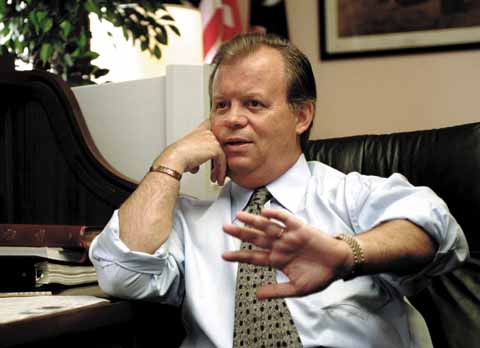
The House Select Committee on Hunger led by Rep. Tony Hall was credited with putting the Hunger on lawmakers' to-do list. It was eliminated in 1993, a decision that Hall protested by fasting for 22 days.
Senators set sights on hunger issue
By Brian Faler
Special to The Washington Post
November 26. 2004 8:26AM
W
ASHINGTON - A group of senators from across the political spectrum has banded together to help put the often-forgotten issue of hunger on the congressional agenda.
They call themselves the Senate Hunger Caucus, and since the caucus was created in June, one-third of the entire chamber has joined up. The group aims to focus the Senate's - and the public's - attention on what experts call "food insecurity."Food insecurity is a bureaucratic term that refers to the situation of someone who is uncertain he will have enough to eat.
A little-noticed report released last week by the Agriculture Department found that 11.2 percent of all American households - about 12.6 million of them - were "food insecure" at some point last year. Two-thirds of the group said they were ultimately able to avoid going hungry by, for example, eating a less varied diet or getting public assistance. But one-third reported one or more members of their households going hungry in 2003. Black and Hispanic households were twice as likely to report being concerned about getting enough to eat. Nearly one-third of households headed by single mothers reported similar concerns; children in 207,000 households, the report said, went hungry at some point last year.
One of the caucus's first orders of business, said Sen. Blanche Lincoln, a Democrat from Arkansas, one of the group's founders, will be keeping the issue on the Senate's front burner.
"We have to talk about priorities,"Lincoln said. "We'll alert members and bring to their attention the seriousness of the issue."
But the group hopes to do more than highlight the issue. Its mission statement describes its purpose as providing a forum for lawmakers and their staffs to learn about hunger issues, giving anti-hunger advocacy groups a beachhead on Capitol Hill and supporting "legislative initiatives and funding requests that help address hunger."
The last may be an uphill battle. The caucus does not have its own staff. Or budget. Or office. Moreover, when Congress returns to work early next year, it will have plenty of other priorities. The Bush administration has signaled that it wants Congress to focus on such issues as Social Security reform, revamping the tax system and rewriting medical liability laws.
What is more, the government budget for the next fiscal year is expected to squeeze nearly every federal program - a particular threat to anti-hunger initiatives. While such programs often enjoy bipartisan support, they also serve politically weak constituencies. The hungry do not have high-priced lobbyists, do not contribute to campaigns and do not vote in large numbers.
But congressional aides said the caucus will have some levers to pull. It plans to work the system, lobbying members of relevant committees and subcommittees to support food programs as they wend their way through the appropriations process next year.
Some caucus members, such as Sen. Dick Durbin, D-Ill., sit on committees with jurisdiction over some of the programs. Aides said the bipartisan nature - it includes 22 Democrats and 11 Republicans, including such odd political bedfellows as Massachussetts Democrat Ted Kennedy and Mississippi Republican Thad Cochran - can only help. It might also be able to use its sizable voting bloc to defend its initiatives.
In the meantime, though, the group is still getting organized - five months, especially during an election year, aides said, is not enough time to get much done. It has met with former senator George McGovern, D-S.D., who led a prominent Senate select committee on hunger in the 1960s and 1970s, and with anti-hunger groups. Some of the lawmakers' staffers have volunteered at local food kitchens.
It has been almost a decade since there was a similar congressional organization that focused exclusively on hunger issues. There was a more formal group in the 1980s and early 1990s called the House Select Committee on Hunger. Led by Rep. Mickey Leland, D-Texas, and later, by Rep. Tony Hall, D-Ohio, the group was credited with putting the issue on lawmakers' to-do list. It was eliminated in 1993, a decision that Hall protested by fasting for 22 days. A House hunger caucus, which succeeded the committee, was cut in 1995. Some House members are organizing a new caucus.
"It's really very important," said Doug O'Brien, of America's Second Harvest, an anti-hunger advocacy group. "We're talking less and less about program increases and now about simply program protection. If we didn't have this group of, for lack of a better term, superstars working this debate, I'm not sure we'd fare so well."
------ End of article
By Brian Faler
Special to The Washington Post






